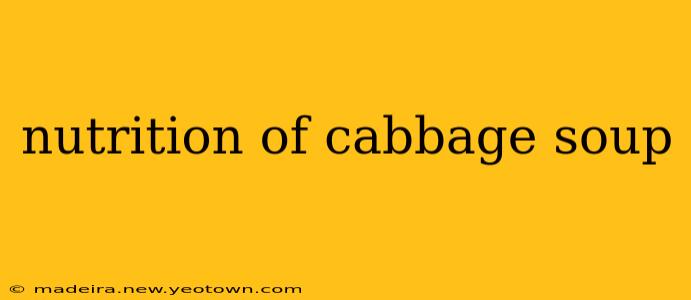Cabbage soup. The name might conjure up images of bland, watery meals, but the reality is far more exciting. This humble dish, often associated with weight-loss diets, is a nutritional powerhouse packed with vitamins, minerals, and fiber. Let's delve into the surprising nutritional benefits of cabbage soup and uncover why it deserves a place in your healthy eating repertoire.
My grandmother, a woman whose wisdom extended far beyond her impressive baking skills, always swore by cabbage soup. She'd tell stories of how it helped her through tough times, not just because it was inexpensive and filling, but because it made her feel good. And now, with a deeper understanding of nutrition, I understand exactly why.
What are the main nutrients in cabbage soup?
This depends, of course, on the recipe! A simple cabbage soup, featuring primarily cabbage, broth, and a few vegetables, will differ nutritionally from a more elaborate version with beans, meat, or a rich tomato base. However, some common nutritional components include:
- Vitamin C: Cabbage is a good source of this vital antioxidant, crucial for immune function and collagen production.
- Vitamin K: Important for blood clotting and bone health, this vitamin is also present in decent amounts in cabbage.
- Fiber: Both cabbage and other vegetables commonly included (like carrots, celery, and onions) are excellent sources of fiber, promoting digestive health and regularity. Fiber also contributes to feelings of fullness, which is why cabbage soup is often part of weight management plans.
- Potassium: Essential for maintaining healthy blood pressure, potassium is found in several vegetables used in cabbage soup recipes.
- Antioxidants: Beyond Vitamin C, cabbage and other vegetables in the soup contain various antioxidants that combat free radicals and may reduce the risk of chronic diseases.
Is cabbage soup good for weight loss?
This is a question often associated with cabbage soup, and the answer is nuanced. While cabbage soup can be a helpful part of a weight-loss strategy, it's not a magic bullet. The high fiber content contributes to satiety, meaning you feel fuller for longer, potentially reducing overall calorie intake. The low calorie density of the soup itself also helps. However, sustainable weight loss requires a balanced diet and regular exercise. Relying solely on cabbage soup is unlikely to yield long-term, healthy results.
What are the health benefits of cabbage soup?
Beyond weight management, cabbage soup offers several health benefits:
- Improved Digestion: The high fiber content promotes healthy bowel movements and prevents constipation.
- Boosted Immunity: The vitamins and antioxidants contribute to a stronger immune system.
- Heart Health Support: Potassium and the overall low sodium content (depending on the recipe) can support heart health.
- Reduced Inflammation: Some studies suggest that certain compounds in cabbage may have anti-inflammatory properties.
What are the potential downsides of eating cabbage soup?
While generally healthy, there are some potential drawbacks to consider:
- Nutrient Deficiencies: If consumed exclusively or for extended periods, a cabbage soup diet might lead to nutrient deficiencies due to its limited variety.
- Gas and Bloating: The high fiber content can cause gas and bloating in some individuals.
- Lack of Essential Nutrients: Depending on the recipe, the soup may lack sufficient protein or healthy fats.
Is cabbage soup good for gut health?
The fiber content in cabbage soup contributes positively to gut health by feeding beneficial gut bacteria and promoting regular bowel movements. However, it's important to remember that a diverse diet, including a wide range of fruits, vegetables, and whole grains, is crucial for optimal gut health.
How many calories are in a bowl of cabbage soup?
The calorie count varies dramatically depending on the ingredients and recipe. A simple vegetable-based cabbage soup will be significantly lower in calories than one containing meat or rich additions. It's best to calculate the calories based on your specific recipe using a nutrition calculator or app.
My grandmother's legacy isn't just a collection of recipes; it's a testament to the power of simple, nutritious food. Cabbage soup, while not a miracle cure, is a delicious and nutritious addition to a balanced diet. Enjoy it responsibly, as part of a holistic approach to health and well-being.

